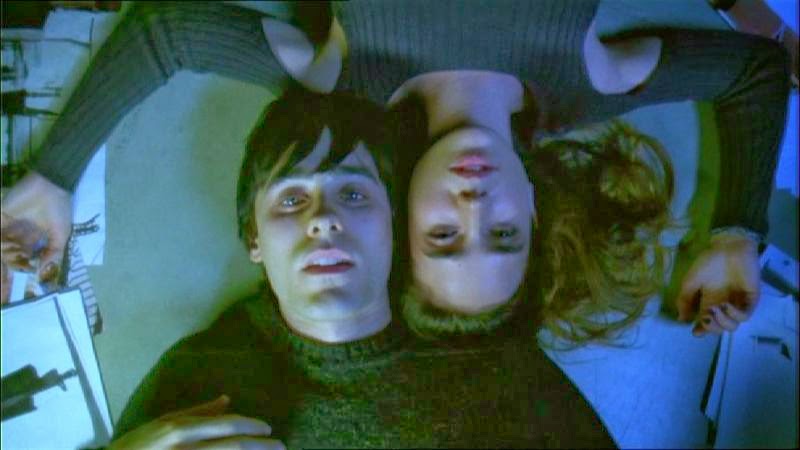Artists are probably some of the most courageous and strong-willed individuals in existence because most of their inspiration is derived from the intense suffering that usually envelops their own lives. Since they understand and identify with the content that goes in their products, they have little trouble in finding a loyal audience. And though their motivation can at times lead to bizarre and ambiguous endeavors, they have to be applauded, if only for the fact that every ounce of pain that has been inflicted on them inspires them to create rather than to destroy.
Monday, January 29, 2001
Billy Elliot / **1/2 (2000)
Parents are bestowed with the responsibility of shaping their children into respectable adults, but that doesn't give them the unbounded permission to dictate every minor detail of their lives: the way they think, act, talk, walk, aspire, or even breathe. Of course a parent doesn't intentionally keep his or her offspring on these short leashes, because their basic intent is for a child to grow up in a happy environment, not one in which rules are more like choke-holds. Given the circumstances, exactly how does a kid break away from this kind of tight grasp to make some of their own decisions without seeming disobedient or rebellious? The key is in good communication; unless the little one has some kind of courage to tell his parents how he or she feels, the situation faces no improvement. In fact, those who simply let their elders run their lives down to the last detail will sense that dictation looming over them even after they've grown up and moved on.
Traffic / *** (2000)
What a challenge it would be to imagine a day in the life of director Steven Soderbergh. Here is perhaps the most highly recognized (and praised) filmmaker of 2000, a man who had not one but two critical triumphs to his name during the year, and is now being looked at as a double front-runner at this year's upcoming heated Oscar race. How does he handle the pressure? Where does he find the time and energy to successfully pull off two big hits in just a space of nine months? And last, but certainly not least, where does he inherit that incredible sense of style?
Friday, January 19, 2001
Cast Away / ** (2000)
"Cast Away" is a movie divided by its own warped conviction, an odd and unbalanced undertaking that pays distinctive attention to the appropriate elements but then draws back at all the wrong moments, ultimately leaving us unsatisfied and, in ways, feeling ripped off. Presented in three phases, the story clearly operates under opposing values, because while the first act is exhilarating and the middle mildly intriguing, the finale is a complete miscalculation, so wretchedly played that it does little but drag down everything that precedes it.
What Women Want / ** (2000)
Assume for a moment that men were really able to listen in on the deep personal thoughts of the human female. What exactly would they hear? Dark secrets? Exotic desires? Perhaps shocking confessions? A mixture of all these things? The extent of the human mind boggles us, so no one can be exactly sure as to what is buried beneath the female cranium. Nonetheless, the attempt to presume what goes on inside makes for quite an interesting idea in a motion picture, and in "What Women Want," we see a thought-provoking spin in which Mel Gibson plays a man whose severe miscalculation of himself as heaven's gift to women is overturned when he is given the incredible opportunity to hear every thought that jumps out of their heads.
Friday, January 12, 2001
State and Main / **** (2000)
Small-town America has proven to be one of the easiest targets for comedic exploits in the movie industry, and no wonder: the idea that an isolated, close-knit community occupied by people who know the names and affairs of nearly everyone else in town could be turned upside-down by scandal, commercialism or similar issues, seems to open up the floodgate for enormous potential. The principal merit in such an endeavor is not usually the plot itself, however, but the colorful characters involved, who tend to be portrayed by the most unlikely actors and are generally conceived with bizarre identities and questionable personal values in mind. Need examples? Think for a moment about the quirky ensembles of "Fargo" and "Mumford."
Friday, January 5, 2001
Tigerland / ***1/2 (2000)
The war depicted in Joel Schumacher's "Tigerland" is fought not on the battlefields, but on the turf of a Louisiana-based instruction camp between several soldiers-in-training, whose fears of a seemingly ill-fated future fill them with anxiety strong enough to warrant sudden outbursts. Just the mere mention of Vietnam sends chills down their spines; perhaps the only thing preventing them from collapsing on the spot is the U.S. army's long-established incentive to fight for your country no matter how severe the situation is. In ways, this may be a precise reflection of the atmosphere that surrounded all the real American soldiers on their way to Vietnam in the 1960s. The only question that remains: was it all necessary?
Requiem for a Dream / ***1/2 (2000)
It can be said that an addiction to drugs is like hiking in circles, because no matter where that person begins, the path that follows leads nowhere but directly back to the one position where it all first began. Sooner or later, addicts will have to reconfront the exact issues that initially spurred those addictions: money problems, curiosity, escapism from a crumbling life, and so on. Seldom is something meaningful ever gained in the process, needless to say; although there are moments when the drugs seemingly suspend all rules and set them free, the aftermath deals out a heavy share of damage, both psychological and physical. The extent of the damage all depends on the length of time such a dependency lasts.
Subscribe to:
Posts (Atom)








